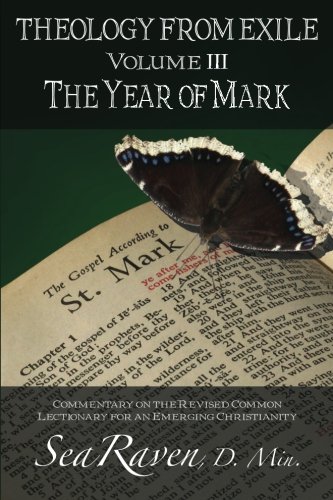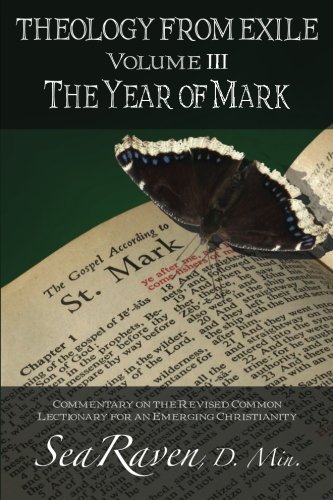Theology From Exile Volume III: The Year of Mark

Amazon.com Kindle Link
http://www.amazon.com/dp/B00NFYSJG0
Published August 2014
The Year of Mark is the third in a series of commentaries on biblical scripture found in the three-year cycle of Christian liturgical readings of the Revised Common Lectionary. Following the RCL provides a convenient format for Bible study for clergy and lay leaders (“believers in exile”) who are drawn to the social justice mandate found in Jesus’s teachings, but who no longer find meaning in orthodox interpretations of scripture. The continued existence of a Christian “faith” as a religious system of belief is clearly under siege by twenty-first century Biblical scholarship as well as the continuing evolution of scientific knowledge. The question addressed by this series is whether and how ancestral scriptures remain relevant and revelatory to twenty-first century cosmology. The project is grounded in the postmodern biblical scholarship of Karen Armstrong, Marcus J. Borg, John Dominic Crossan, and the Jesus Seminar, as well as the transforming work of Rev. Dr. Matthew Fox, whose theology of Creation Spirituality has reclaimed Catholic mysticism for the third millennium.
INTRODUCTION
Since 1985 with the founding of the Jesus Seminar, the field of research on early Christian origins and the development of the New Testament must be described as “volatile.” With this third volume of commentaries the Westar Institute scholars version of New Testament translations of the gospels is more useful to the emerging theology than the NRSV. Quotations therefore may be assumed to be from “The Complete Gospels”(1) unless otherwise noted.
As an example of the transformation in the expected glacial progress of biblical scholarship, Marcus Borg agrees with the consensus that dates John’s gospel in the 90s; he also agrees with a theory gaining acceptance that John predates Luke, which is now thought to date from early second century.(2) The ground seemed to be shifting even more at the Westar Institute’s 2013 Fall meeting. The presentation of the report on the Acts Seminar included the suggestion by Joseph B. Tyson(3) that while scholars agree that the same person likely wrote both the gospel of Luke and the Acts of the Apostles, Acts may have been written before the gospel. Even more dizzying for Christian tradition, the so-called “proto-Luke” known to and used by Marcion did not include Luke’s beloved birth stories and seems to end with the sharing of bread and fish on the road to Emmaus.(4) Faith as belief in the historical veracity of the accepted orthodox Christian understanding of the life, death, and resurrection of Jesus appears more and more to depend on political and cultural shifting sands. Faith as trust in the value of Jesus’s message to sustainable human life on Planet Earth stands on the rock of human experience with distributive justice-compassion – whether of the Buddha, the Christ, or simple, evolutionary, human empathy.
The writer of Mark’s gospel likely witnessed the sacking of Jerusalem and the destruction of the Temple. With the Temple gone, Judaism – exiled again – changed profoundly, and the Jesus movement that got its start within Judaism developed its own spiritual identity. John Shelby Spong suggests the gospel of Matthew may have been written to replace the traditional Jewish readings that marked the Jewish liturgical year,(5) but that seasonal rhythm has been long lost to Christian practice. The creator of the gospel of Mark, writing for a traumatized community cut off at the roots, would like to take us on a faith journey that reveals and confirms the identity of the Messiah at the end. But the Christian year begins with Advent and birth stories that Mark did not include; and the often foreshortened, moon-determined, liturgical demands of Easter seem not to allow enough time between the Christmas season and the beginning of Lent to get the full metaphor of Mark’s Jesus on the road from Nazareth to Jerusalem. Much of Mark’s material appears in Matthew and Luke, and those portions are apparently preferred over Mark’s original context. Repetitive stories in Matthew and Luke are also redacted by the creators of the RCL, and passages in any of the gospels that seem“difficult” or raise questions outside accepted orthodoxy are never considered in the three-year cycle.
These considerations combined with the bare bones of Mark’s original seem to compel the use of the Gospel of John for fully half of Mark’s Year B. The political, social, spiritual, and economic history of most of the Western world has been defined by the belief articulated in the literal application of John’s gospel to personal and social piety. If Christianity is to survive with any relevance to postmodern, twenty-first century realities, the theology of condemnation and substitutionary atonement associated with the fourth gospel has to be scrapped. Not only is the future of Christianity at stake. This theology threatens the further evolution of human consciousness, and life as humanity has known it thus far on Planet Earth.
The RCL can provide a convenient way to consider the Christian New Testament in light of its Jewish ancestry if done with eyes wide open to the pitfalls of orthodox assumptions from both traditions. As pointed out in the introduction to Volume II, much of the history of the creation of the New Testament may be “old hat” to graduates of liberal Christian seminaries, but lay folk committed to Jesus’s Way need to know something of the scholarship that is doing its best to lead Christianity out of the clutches of fundamentalism. The purpose of the RCL is not biblical literacy, nor is the purpose to illuminate Christian tradition through an understanding of Jewish scripture. The purpose of the RCL is to promote Christian orthodox belief as the culmination of world religious belief systems. Jesus Christ is Lord, and the body of Christ – the Church – is the representative of the imperial rule of Jesus Christ over all of creation until he returns on the solar winds from the depths of space in the final judgmental conflagration.
The time has come for a new common lectionary – if that is at all possible. Such a lectionary cannot have as its purpose the hegemony or supercession of one religious system over another. Such a lectionary should start with scholars’ versions and interpretations of the four gospels and the authentic letters of Paul, and should explore more of the Jewish scriptures than just those portions that are referenced in the canonical sources (with a careful eye for anachronistic interpretations). The founding myths of Judaism, the prophets, psalms, writings, and protest literature, continue to illuminate the human condition and what to do about it. Beyond that, a new common lectionary might include as “pastoral letters” or “pastoral essays” contemporary and historical writings from secular and non-Christian sources such as the works of Martin Luther King Jr., the Dalai Lama, Tich Nat Han, and others.
In the 2013 Yale Divinity School Beecher Lectures, Rev. Dr. Robin Meyers called for a counter-cultural church that resists ego, orthodoxy, and Empire:
What happened to the church that once gave the Empire fits and now fits right in with the Empire? Furthermore is there anything in our time that would more clearly mark the church as genuinely subversive to the status quo than for us to once again resist the illusions of Empire especially the myth of redemptive violence? Evangelicals are correct in my opinion when they say that the cross is the center of our faith, but not as a mark of some cosmic bargain but rather of cosmic resistance – the ultimate symbol of the lengths to which love will go to save us from ourselves.(6)
My intrepid editor, George Crossman, has the last word: “There remains for me one more unresolved element, however: the approach [in these commentaries] appears to put limits on God’s power to forgive. You have to enter into the great work, which includes dealing with personal injustices you yourself have created. God’s mercy has a price tag. God only works through us, not outside of us. As Bishop Tutu has said “Think of it! God depends on you!” It is a mystery. But it is true. Put another way, orthodoxy promises forgiveness in return for credal belief. Jesus’s message is that righteous action is the essential condition, not belief. Not cheap piety but sacrificial action is the Way. Sounds a bit like Amos.”
1. Miller, ed., 2010.
2. See, e.g., Borg, Evolution of the Word.
3. Professor Emeritus of Religious Studies at Southern Methodist University, Dallas, Texas.
4. For the complete argument see BeDuhn, The First New Testament.
5. Spong, Liberating the Gospels.
6. Robin R. Meyers: “UNDONE: Faith as Resistance to Empire” Beecher Lectures video, Yale Divinity School
You may also be interested in Sea Raven’s other books:

